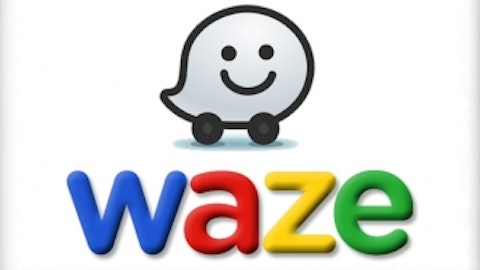
A pioneer in streaming music
Pandora Media Inc (NYSE:P) is among the pioneers in streaming Internet radio. The business model is simple: Pandora offers a free, advertiser-supported radio service and Pandora One, an ad-free service available for $4 per month or $36 per year. The ability to listen to Pandora on virtually any connected device (including computers, mobile devices, and home entertainment devices) and create and refine customized stations has attracted over 70 million active users to listen to Pandora over a billion hours a month. In the most recent quarterly results, Pandora reported revenue growth of 55%. With such strong revenue growth and users and hours listened increasing by 33% and 22%, respectively, over the prior year, this would seem to be a healthy business. However, a deeper look indicates otherwise.
Unprofitable business model
Even with staggering growth rates and an increase in market share to over 7% of the radio listening market in the United States, Pandora Media Inc (NYSE:P) hasn’t come close to profitability. The company reported a net loss of $29 million during the most recent quarter and continues to burn cash through negative cash flow from operations (as well as negative free cash flow). This chart shows just how disconnected Pandora’s top line growth and profitability are:

Content acquisition costs have continued to surge and equate to 66% of revenue in the most recent quarter. Spending two thirds of revenue just to acquire music rights does not exactly leave much room for software development, marketing, and employee costs.
There is already plenty of competition
Even before bringing iTunes Radio into the discussion, 93% of radio listeners use a service other than Pandora Media Inc (NYSE:P). Listeners seeking free, advertiser-supported radio options listen to traditional over-the-air AM and FM radio stations, HD radio, or free streaming services such as iHeart Radio. The premium radio market is dominated by Sirius XM Radio Inc (NASDAQ:SIRI), whose satellite radio services (and optional streaming service) include premium sports, news, and celebrity content.
As a means of comparison, Sirius XM’s 24.4 million paying subscribers dwarf the 2.5 million subscribers to Pandora One. Sirius XM’s significantly broader content allows it to command an average revenue per user (“ARPU”) of $12, which is four times the monthly fee for Pandora Media Inc (NYSE:P) One. As a result, Sirius XM Radio Inc (NASDAQ:SIRI) generates around eight times more revenue than Pandora even without the benefit of advertising. As a result of this scale and revenue generating ability, Sirius is profitable, generates solid free cash flow, and can even return value to shareholders through share repurchases.
In contrast, Pandora Media Inc (NYSE:P) remains on track to burn through its existing cash balances and likely requires more funding at some point in the future.
Pandora’s service has limitations
Pandora Media Inc (NYSE:P) is unprofitably trying to forge a dominant position in the radio listening market. While growth rates have been impressive, a key risk to Pandora over the long term is the lack of complimentary products and services that can differentiate it from iTunes Radio or any other streaming service. For example, Sirius XM Radio Inc (NASDAQ:SIRI) is certainly differentiated from Pandora in that the company’s core satellite radio business requires proprietary hardware. The significant installed base of satellite radios in late model vehicles provides a tremendous advantage.
More importantly for those users that primarily listen to the radio on the road, Sirius XM Radio Inc (NASDAQ:SIRI)’s satellite radio service will not consume tremendous amounts of mobile data. In contrast, Verizon Wireless’ website estimates that one hour per day of streaming audio will use almost 1.8GB of the average smartphone’s 2GB per month data plan. As a result, the cost of listening to Pandora outside of a wired or WiFi environment can be prohibitive for users on the go. This is especially relevant for users that primarily listen to radio during a lengthy commute each day.
“Stickiness” may be Pandora’s downfall
Here’s where Apple Inc. (NASDAQ:AAPL) fits into Pandora Media Inc (NYSE:P)’s future. While Apple’s radio service seems to have a lot of the same functionality as Pandora’s, the stickiness of the Apple ecosystem and the way in which Apple devices and applications work seamlessly together is an under-appreciated competitive advantage.
While both Pandora and iTunes radio allow for customizable stations based on user preference, iTunes Radio goes one step further by integrating a user’s iTunes purchase and listening history. Utilizing the tremendous amount of data from a listener’s history using iTunes creates a huge advantage in efficiently tailoring a station that best fits the listener’s taste. Plus, iTunes Radio incorporates this data automatically rather than requiring constant feedback in order to refine a Pandora station.
For the premium ad-free experience, iTunes Radio surpasses Pandora with ad-free service for iTunes Match subscribers. For $25 per year (30% cheaper than Pandora One), iTunes Radio users will receive the same commercial-free experience as Pandora as well as cloud-based access to a listener’s entire music library whether it was purchased on iTunes or not. Cloud-based access to an entire personal music library is simply not something that Pandora Media Inc (NYSE:P) is equipped to offer customers.
Add in a number of extra features, including voice-recognition commands through Siri and iTunes exclusive content, and there are a number of reasons that iTunes Radio is a more compelling alternative than Pandora.
Any Pandora user that has an iOS device or an iTunes music library has a strong incentive to try iTunes Radio instead of Pandora whether it be for the more customized experience, the ability to listen to a music library on other devices via the cloud, voice recognition capabilities, or cost. Given the hundreds of millions of iOS devices in use, that is a tremendous portion of the streaming music population.
So what would cause listeners to continue to choose Pandora? The only notable advantage is the ubiquity of Pandora; the company has apps for more devices than Apple Inc. (NASDAQ:AAPL) does, including smartphones running Google Inc (NASDAQ:GOOG)‘s Android operating system and home entertainment devices such as Roku boxes, connected televisions and blu ray players. Pandora, like Netflix, Inc. (NASDAQ:NFLX), is one of the few content providers that has made its applications available on almost any device. This is Pandora’s most significant competitive advantage and is certainly one to continue to monitor. Without this advantage, the investment thesis for Pandora Media Inc (NYSE:P) disappears completely.
How can Pandora support a market capitalization of almost $3 billion?
As this article summarizes, Pandora is far from profitability and does not have a clear path towards generating solid earnings despite tremendous revenue growth. Meanwhile, the competition for radio listeners is highly-competitive and became even more so when Apple Inc. (NASDAQ:AAPL) unveiled a competing product that is largely comparable to Pandora’s with a few notable advantages. Without the benefit of a must-have feature that differentiates Pandora from the competition or the benefit of user stickiness from a larger ecosystem to attract users, it is difficult to find a way for Pandora Media Inc (NYSE:P) to justify its current market capitalization of almost $3 billion.
Based on this assessment, I will back up my bearish sentiment on Pandora with an underperform CAPScall.
Brian Shaw owns shares of Apple Inc. (NASDAQ:AAPL) and Google Inc (NASDAQ:GOOG). The Motley Fool recommends Apple, Google, and Netflix. The Motley Fool owns shares of Apple, Google Inc (NASDAQ:GOOG), and Netflix, Inc. (NASDAQ:NFLX).
The article The Beginning of the End for Pandora? originally appeared on Fool.com.
Brian is a member of The Motley Fool Blog Network — entries represent the personal opinion of the blogger and are not formally edited.
Copyright © 1995 – 2013 The Motley Fool, LLC. All rights reserved. The Motley Fool has a disclosure policy.





